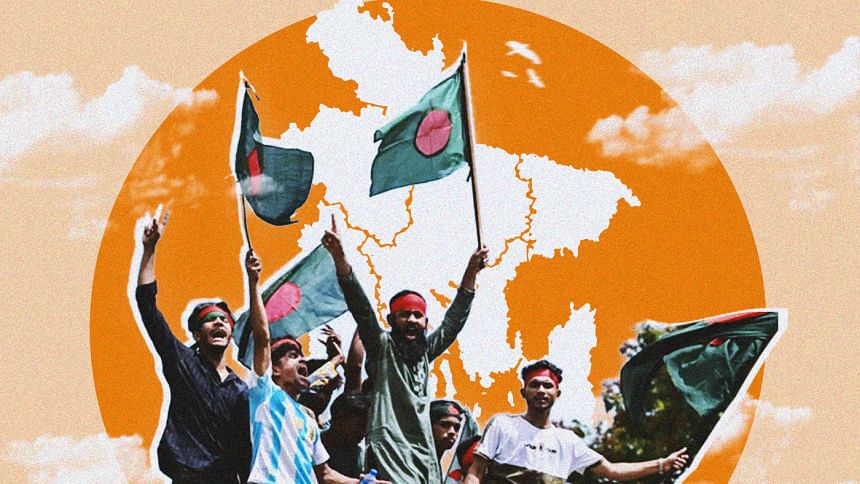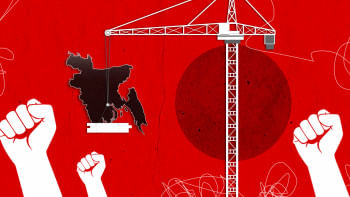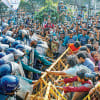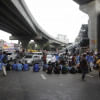What politics for the new generation should look like

On August 3, when Nahid Islam made his announcement from Central Shaheed Minar regarding the one-point demand for Sheikh Hasina to step down, he also said something important that might've gotten lost in the clamour. Nahid's call to build a new political settlement where no dictatorship can ever take root again is one that will eventually be vital for the future of Bangladesh.
In the aftermath of the Awami League government's ouster, it takes scant reflection to realise that the political settlement that has existed since the revival of democracy in 1991 has categorically failed. The BNP's repeated refusal to hand over power to neutral caretaker governments in 1996 and 2006 followed by the Awami League's death grip on the nation for 15-plus years stand testament to this failure.
The period since 1991 has seen repeated attempts by whoever is in power to silence, imprison, and neutralise whoever is in the opposition. While this lack of trust and goodwill among politicians has weakened the country's democracy, all of this was done with a disdain for public welfare. Governments at certain points did oversee the physical and human development of the country, but whenever it came down to a choice between public safety and the continuation of the incumbent's hold on power, the latter was chosen. From forming partisan election commissions to conducting sham elections, and then lying to the public through their teeth—this treatment has been the norm for decades now, so much so that a vast part of society started to get used to it.
Unlawful apprehensions by government-backed law enforcers, criminal activities by student and youth wings of the ruling political parties, and corruption in the bureaucracy went unchecked. There has always been an air of inevitability in all of this, that this is how the powerful in Bangladesh are supposed to treat the powerless. Unless one wishes to turn from an innocent bystander to a victim, they had better stay quiet.
All of this points to a prevailing lack of respect for the ordinary people among the ruling class in Bangladesh. Whether or not this disrespect is a result of weak democracy, or if the weak democracy is a result of the disrespect, can be debated like the chicken-and-egg problem. But the differing levels of tolerance for this disrespect is a good place to start if we want to understand why the buck stopped with this new generation, whose legitimate demands—met with disdain and disproportionate force—became a catalyst for a mass uprising, the first of its kind since 1990.
Before delving into the politics that might be acceptable for the new generation, let us try to understand who they are as people. Popular discourse enjoys exploring the vocabulary of Gen Z and marvelling at their courage and indomitable spirit, but looking at the root of these things may be a more productive venture. Solely focusing on how the Gen Z is different from the rest of society—and even exoticising them—is counterproductive in the sense that it creates an artificial barrier for the rest of us to realise and internalise the values that helped them achieve the impossible.
We must not forget that the new generation is only a younger version of us—they are our younger siblings and our children. Yes, their world has been shaped differently by access to the internet from early childhood, but what exactly is the effect the internet has had on them? What part of their humanity did it kindle that they were able to uproot the evil spirit of autocracy that had descended upon this country, that many others before them failed to even stand up to?
Having spent a considerable part of my career working at a youth magazine, working with people born right before or after the turn of the millennia, and being born in that same period myself, my observation of this generation is that their sense of individuality is strong. The internet allows everyone to be a person defined by their own interests and beliefs, as opposed to a person shaped—or limited—by their surroundings and physical reality. This is, of course, not universal and should only be thought of as a trend in opposing directions for people of different generations. However, this stronger sense of self leads directly to a stronger sense of self-respect, and with young people, that is what makes the buck stop.
Young people have wider horizons from which to draw their context, and for them, all the injustices that their parents have grown used to are injustices that have no place in the world. When they make an honest effort to do away with these broken systems and their voices aren't heard, when they are misled, lied to, attacked with the unlawful yielding of laws and guns, they do not have the appetite to stand and accept that. You push a person with self-respect too far, and they strike back. You push a generation like that too far, and empires fall.
So what does all of this tell us about the politics of tomorrow? Politicians need to stop thinking of those they wish to govern as their servants, and learn to think of them as their employers. Anyone with a job will know that employers require appeasement, and employees need to be wary of the mood of their employers and work to maintain its balance. Most importantly, the employer's authority demands respect.
Politicians need to start understanding that the loud, unnecessary, intrusive politics that we know today needs to become the politics of the past. Holding up traffic for a party anniversary while regular people suffer is a form of disrespect. Covering every possible surface in public buildings and busy intersections with the unwelcome faces of politicians and the seven generations of underlings they sponsor is a form of disrespect. Going on TV and calling press conferences only to spew laughable lies disrespects the public's intellect. Getting elected through free and fair elections only to turn around and gut democracy so your power goes unchallenged is possibly the worst form of disrespect there is, and the politics for the new generation has no space for it.
What direction our politicians choose to go is up to them, but for the next few decades, whether or not politicians keep their jobs will be determined by the voting public, who will be largely made up of the Gen Z, the Gen Alpha, and those that come after them. It is the responsibility of this interim government, and active politicians, to work towards building a political settlement that espouses an attitude among politicians where they prioritise and respect their constituents. Fair electoral practices and financial accountability and ethical standards for politicians need to be codified with this premise in mind.
We have already seen how the new generation reacts to injustices. If our politicians of the future decide to test these people again, they will do so at their own peril.
Azmin Azran is a journalist at The Daily Star.
Views expressed in this article are the author's own.
Follow The Daily Star Opinion on Facebook for the latest opinions, commentaries and analyses by experts and professionals. To contribute your article or letter to The Daily Star Opinion, see our guidelines for submission.

 For all latest news, follow The Daily Star's Google News channel.
For all latest news, follow The Daily Star's Google News channel. 










Comments